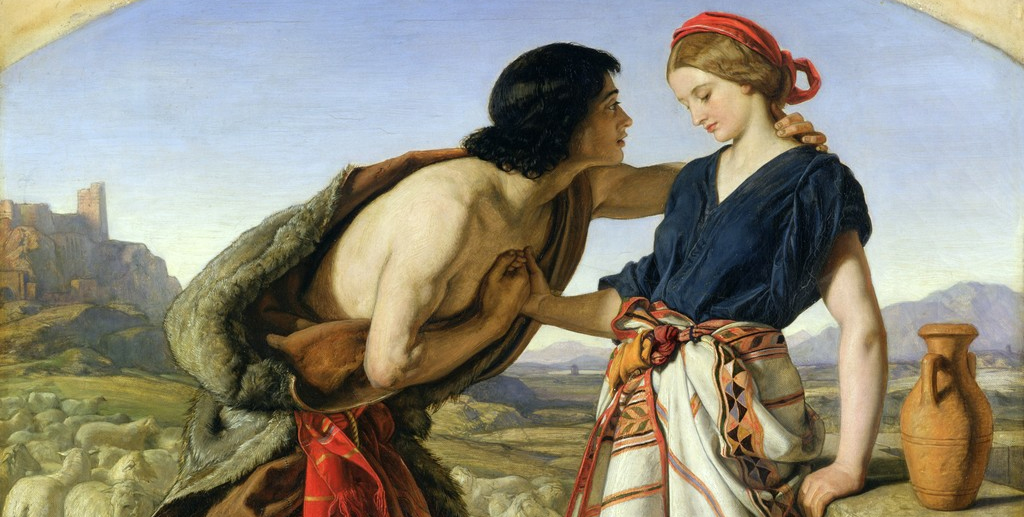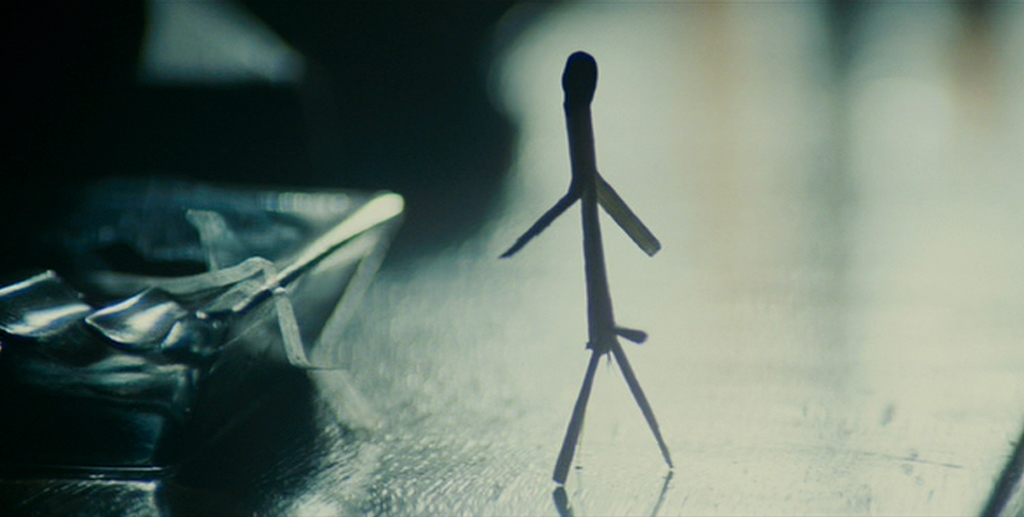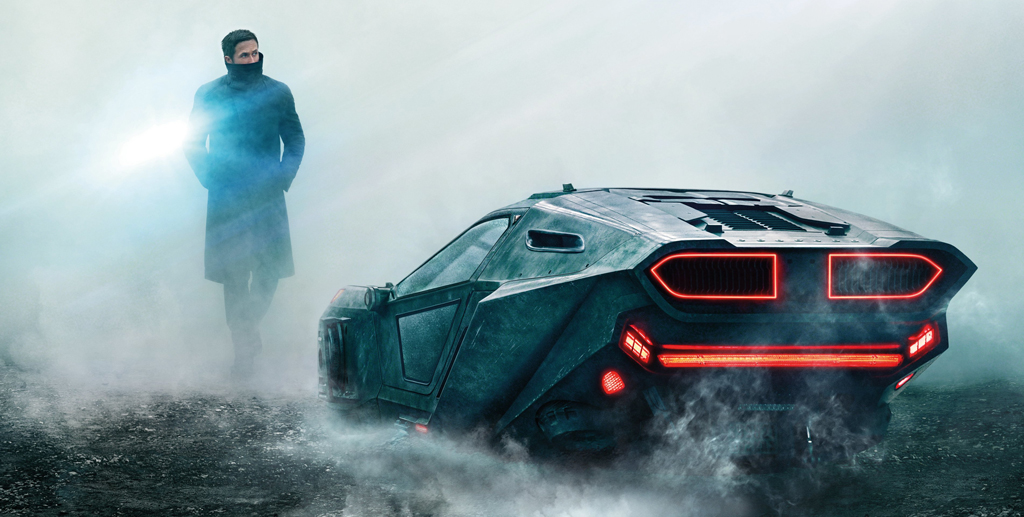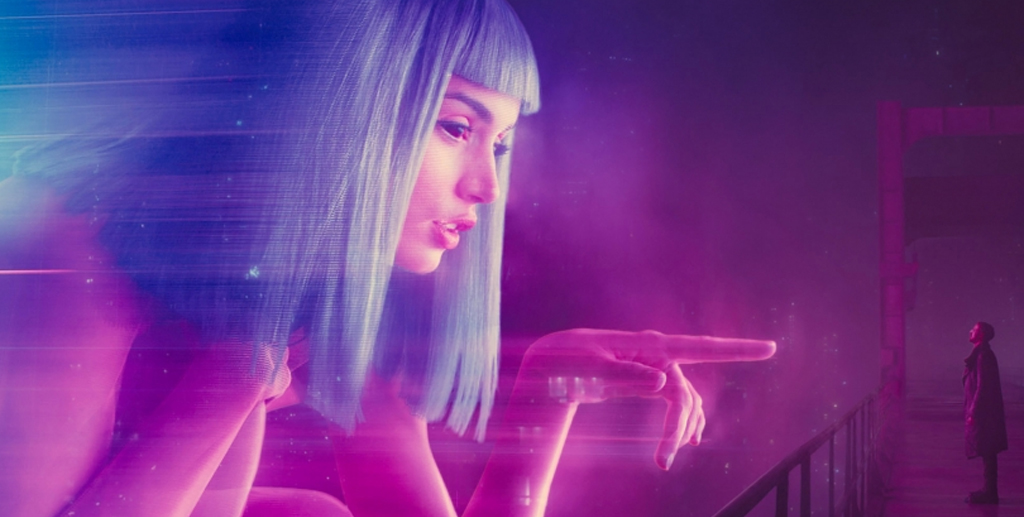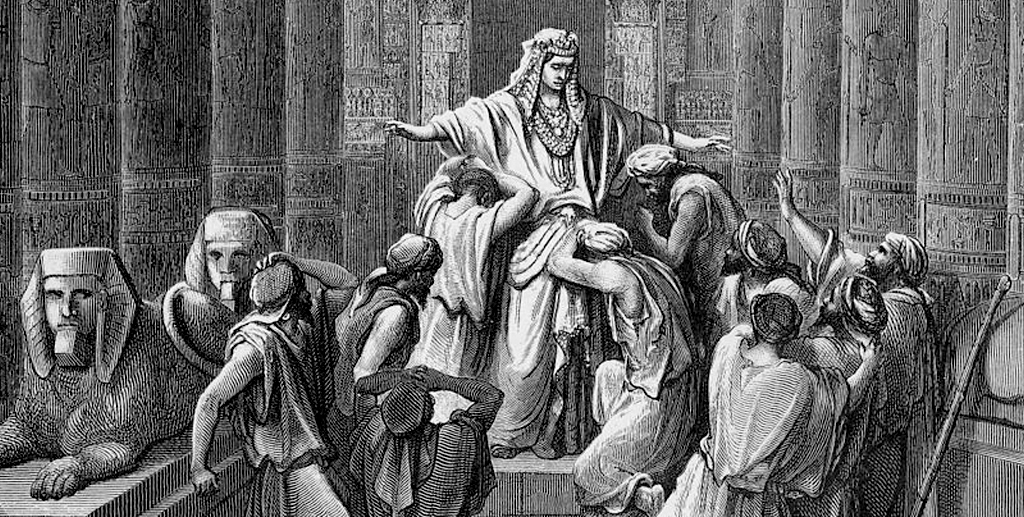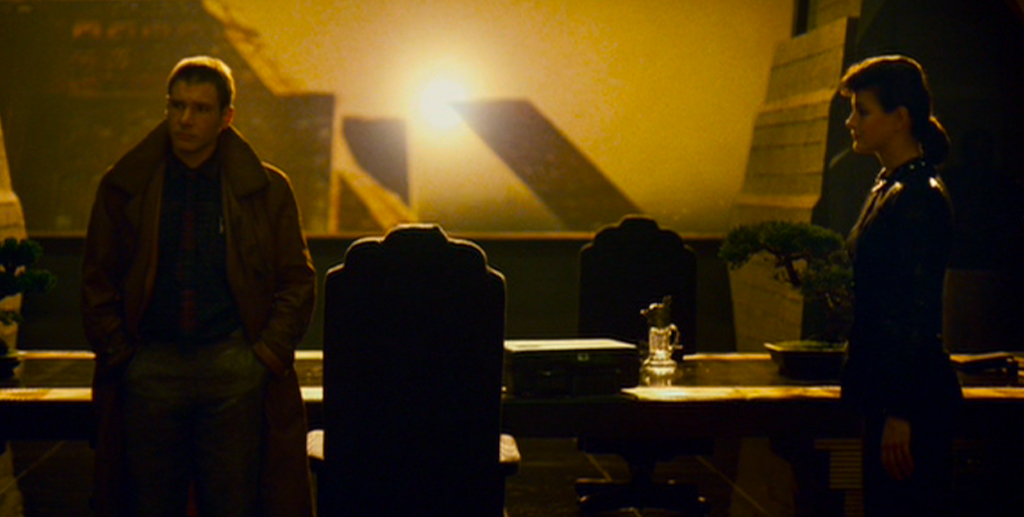A Unicorn Called Rachael: Biblical Allegory in Blade Runner 2049: Part I
By: Drake Dunaway
Meditations
In the livid heat shimmer of the deserts the silhouette of a weary traveler appears before you like a merging orbit of inkblots. This dusty wayfarer hails from far away, venturing this parched and desperate land to flee to his kindred. Behind in Canaan he leaves a dramatic tale that goaded him hither; a slighted brother, a stolen birthright, and a desperate flight as a pauper before the mercies of the frontier. Cue the sheer panoramas of deep deserts, whipping winds, and all the B-reel our minds conjure. That’ll do.
The man’s name is a bit of an oddity in and of itself, probably one that his father bespoke and his mother detested. It resembles the Hebrew word meaning “heel,” a crooked organ emblematic of a crooked mind and life. Yes. This man is a Hebrew, and an underhanded one at that. Time and again the heel-holder would abuse trust, leverage, dissemble, lure, and switch in order to obtain. And at the end of each stratagem he would always come up short in clasping all of what he thought he wanted. Something always lacked. Every challenge he met with legerdemains and end-runs to grasp and get, seldom on the up-and-up and rarely head-on. But make no mistake: hook-and-crook was normally enough to win this stranger the largest wishbone of whatever he prized, tearing away just enough to claim the win. And his crooked heel would serve him reliably enough until he wrestled the Living G-d. For G-d would teach him to trust.
The man’s name is Yaakov. Jacob.
…
Beauty is perhaps the cruelest element in both the dreamverse and that porously separated obligation we call life. It alights into the drear from some gilded beyond that eludes us, torturing and consuming all who can appreciate its rare, entrancing glow. Beauty turns heads. Beauty launches a thousand ships and sorrows alike. And like a chambered nautilus, you can never truly squeeze into the core of it, try as you may. It vanishes – or worse, it fades into the common. Yet often enough, this dark and bitter world outright slays it. Existence does not tolerate the pure and it certainly does not tolerate the beautiful.
Starcrossed beauty falls no more dramatically than in the dark Romanticism of Edgar Allan Poe, who played to the hand-and-hand communion between beauty and tragedy. Poe embodied beauty itself in doleful characters like Lenore, Ligeia, and Annabel Lee, all women of striking and otherworldly bloom, only to murder them with the jagged swoop of a pen and relegate them to the creepy-crawlies that await us all when we wink out.
Beauty: ever fragile. And beauty succumbs abruptly to tragedy with no promise of resurrection. Bleak. Gone. Never to return. And it is that bitter ache of its loss that embellishes its retrospect and exalts the time you clutched it. Beauty’s ghost, now arisen as a siren, becomes ever more haunting and transcendent.
General Review
After recently viewing Blade Runner 2049 with my father, the rumors are true: the film is nothing short of a masterpiece. The story is compelling, atmospherically mesmerizing, and the scope is just phenomenal. Blade Runner 2049 has rare form and stainless cool. And for all the vocal box office populists bewailing the intrusion into their lives of meaning and silence: pound sand. You’re why we can’t have good things, and why Montag’s wife needed a fourth TV. The movie was as stirring and existential as its 35-years forerunner, leaving my father and myself moonstruck and wistful as we exited the empty theater, aching in all the big thoughts we normally shelve to do the needful things. It’s clearly not fare for everyone, but for the happy few for whom it plucks a cord, sci-fi film hasn’t flexed such impressive élan in a very, very long time and damn did this feel good. The director, Denis Villeneuve, eschewed the family friendly appeal and cheap sugar rush that run the box office tables with safe and forgettable adaptations (I, Robot, Ender’s Game). Instead Villeneuve crafted a love letter to the connoisseurs and true fans and directed a film about what it’s supposed to be about. Fine spirits aren’t for everyone, nor is profound reverie. If you’re not into either, stick with whatever Velveeta currently outsells it. But don’t rain on our parade.
Now having dispensed with my general critique, I’m going to curtail the standard reviews of Blade Runner 2049 for a more in-depth plunge into biblical allegory and its significance to both films; namely the life of an elusive unicorn, the biblical matriarch Rachel. This critique will come in two installments. Rachael or Rachel (however you spell it) is a name from the deep past limned with heady, mystical, and feminine power, and it seems no accident that Detective Rick Deckard’s songbird shares namesake with the Torah’s deepest symbol of lovelorn desire.
Jacob’s Unicorn
***SPOILERS BEYOND THIS POINT***
And it came to pass, when Jacob saw Rachel the daughter of Laban his mother’s brother, and the sheep of Laban his mother’s brother, that Jacob went near, and rolled the stone from the well’s mouth, and watered the flock of Laban his mother’s brother. And Jacob kissed Rachel, and lifted up his voice, and wept. – Genesis 29:10-11.
I’m going to assume my readers are already familiar with the scandalous domestic wars that rent the house of Jacob asunder in Genesis, but I will rehash the main points tucked away amid all the tedious begats.
Jacob bilks his brother Esau out of his birthright for stew and then wheedles the blessing of the firstborn from his father Isaac under false pretenses. Esau raises his voice and weeps. Fearing vengeance at the hands of Esau and at the advice of his mother Rebecca, Jacob turns tail for the East across the Jordan to the house of Abraham’s kinsman, Laban. Most notably, Jacob departs destitute (a risk Abraham and Isaac never took). With pockets full of lint and the promises of G-d and forefathers, Jacob arrives at the flocks of Laban. And it is here, at that portentous well, where Jacob spots Rachel for the first time. This time Jacob is the one who weeps. The rabbis offer an explanatory midrash for Jacob’s tears.
“Since he foresaw with the holy spirit that she (Rachel) would not enter the grave with him. Another explanation: Since he came empty-handed, he said, “Eliezer, my grandfather’s servant, had nose rings, and bracelets and sweet fruits in his possession, and I am coming with nothing in my hands.” – Bereishit Rabbathi by Rabbi Moshe Hadarshan
Jacob approaches his uncle Laban with no bargaining chips and gets strong-armed into moiling for seven grueling years for the hand of beloved Rachel. Yet on their wedding night, Jacob’s scheming uncle switches Rachel for her older sister Leah. The couple consummate in the dark and the next morning Jacob meets with crushing disappointment, to which Laban curtly explains that he simply marries off firstborn to firstborn. Had Jacob not stolen Esau’s birthright, none of this would have happened!
Jacob then works for Rachel for another seven long years. And even after he finally has her, he never truly has her, to paraphrase Rabbi David Fohrman. For as we shall see, Rachel is a beautiful ghost who would ever elude Jacob, slipping through his fingers both in life and in death. Rachel is initially barren while Leah yields Jacob a litter, and despite her unending tears of shame, Jacob persists in loving her all the more. Eventually G-d heeds Rachel and opens her womb, but only after years of bitter strife with Leah. Much later when Jacob finally took his wives, children, and flock and booked it back to Canaan, he inadvertently leveled a curse against his one and only Rachel. Upon arriving back in the Promised Land, Rachel perishes during childbirth. And for hasty reasons we don’t really understand, Jacob buries Rachel distant from the family tomb. Then Egypt swallows up the only two fruits of Rachel’s womb, Joseph the mystical dreamer and Benjamin, threatening every trace that Jacob’s ideal even existed at all.
There’s always something in the way. Jacob thought he had her. Then he didn’t. Yet when he finally did, she was barren. Then after she finally bore fruit, Jacob accidentally cursed her into oblivion. Then she dies young. And when she dies, she’s buried apart. Egypt threatens to devour her two sons. And so it goes.
Cull, if you will, my opening meditations on the fragility of beauty, purity, and the ideal when it enters our intolerant world. Now you’re a grizzled Rick Deckard, and you find yourself sequestered in the chic and bedazzling corporate lair of Niander Wallace, a billionaire tycoon with a god complex and a canny knack for allusion as droll as it is twisted. Undulations of aqueous light play vividly along the walls as Wallace in his morbid glory produces the skull of Deckard’s forlorn love, displayed like any other evidence exhibit as he reptiliously strokes her brainpan and recites Genesis 30:22:
“And G-d remembered Rachel, and G-d hearkened to her, and opened her womb.”
In light of Rachel’s tragic story arc in the Bible, the weight of this verse as uttered in passing during Wallace’s macabre interrogation lends a tragic esprit to the life of Rachael the replicant and uncovers what she really meant to Deckard and her “skinjob” race.
Deckard. In the first film we land on a hardboiled loner who deals in a fixer’s side of life to serve the paymasters of his era. Then amidst his seamy, drain-guttered world he embarks on a mission. Coming in from the surly backwash outside Tyrell Corp’s imposing ziggurat in the heavens, Deckard enters a pristine world of technomancy and lands an unexpected encounter with a fleeting angel.
The scene introducing Rachael treats the audience to a captivating skyline bathed in a rare, golden sun, a synthetic owl threshing before Rachael as a symbolic forerunner (the symbol for wisdom and for Lilith, Adam’s first wife). Then, her stilettos clopping out of the darkness and into the lobby, a ravishing woman glides into frontal view with stylistic poise, a one-of-a-kind modern coiffure, treating viewers with an iconic scene for not only the film itself but for cyberpunk at large. This timeless lobby scene is built entirely around Rachael, featuring her demure and vestal charm. In all, Ridley Scott crafted the scene for a potent sense of encounter. Now while Deckard is a stolid man by nature and probably holds his cards close, Gaff later betrays his interest with a priapic origami figurine cluing us in that the detective is hopelessly smitten.
It’s a veritable well scene. A visitor stands stricken by the sight of a lovely daughter while her scheming father figure looks on. The father promised a prototype yet switched it for Rachel, who doesn’t know she’s a replicant. Switched copies. So far, so good.
Everything that follows this encounter – from the first to the second Blade Runner – mirrors the plight of Jacob as he clawed desperately to have Rachel for his own. Deckard becomes a marked man, a fugitive on the lam in a nomadic clamber to cleave to his star-crossed love for as long as he can. Like biblical Rachel, replicant Rachael learns that she is cursed and living on counted days. Like the lachrymose bride of yore Rachael is barren, as are all replicants. And then a miracle birth opens up not only a family but an entire race; in one case Israel, in the other case legitimizing synthetic Man. Rachael dies in labor while giving birth to their daughter Ana, a professional dreamweaver like biblical Joseph, the lad who seeded his kindred with his visions and became the seething envy of all his estranged siblings. Like Joseph, Ana suffered exhile from her wandering father, her identity was concealed from visitors, and authorities immured her in a prison to dream her life away.
Blade Runner 2049 deftly splices national mythos within its plot, but it does not cease with the death of Rachael. But is Rachael’s death where the allegory halts? After all, in the Torah Rachel’s woes do not perish silently with her, and instead they fractal into the next generation in a whole new peepshow of repercussions. Along this vein, Blade Runner 2049 further drags matriarchal motifs even further into the life of Agent K himself long after Rachael’s passing. But we won’t be able to unpack his protagonism without first setting the stage. In the next and final installment we’ll ditch the Jacob narrative for a trice and switch gears to ask what it means to be special.
I hope you enjoy it.
A Unicorn Called Rachael: Biblical Allegory in Blade Runner 2049: Part II
By: Drake Dunaway
In the first installment of this analysis, we established a clear connection between Detective Rick Deckard’s love interest and the biblical matriarch Rachael. We left off with the death of Rachel the matriarch, the repercussions of her tragic life, and asked if and how similar repercussions beleaguer Agent K and Nexus 9 models like him years after the death of Deckard’s paramour. But in order to do that, we must first explore what it means to be special.
Special K
In the bleak, dystopian Los Angeles of 2049, world-weary denizens shuffle into work stations under dreary skies, stormdrains swirl with their faded memories, and they live transfixed by artificial holograms dancing to their hopeless dreams. No place or time could be more in famished of memory, dream, and hope. In fact, phony advertising wouldn’t hold the thrall it does were it not buttressed by a shitty world that keeps us moth-drawn to the pretty neon. This goes for future Los Angeles as well as our own lives.
Enter Agent K, a blade runner in his own right who carries out his brutal work in the tradition of Rick Deckard, stands stolidly through dressdowns by a hard-ass Lieutenant Joshi, and comes home to a cherubic AI hologram aptly named Joi, whose sole task it is to make K feel…special. Holographic steak. Light your smoke? How was your day? You’d hardly know it’s a task. And maybe it isn’t. Every conundra of the Spike Jonze film Her our Blade Runner 2049 simply takes for granted. And this leaves the audience to imagine what premiums people are willing to pay just to be told in so many sweet nothings that they matter to someone. What is something like that worth? To be special? Evidently a lot. And perhaps onliness resonates all the more to numbered, prefab drones slaving in the ninth circle. To paraphrase Lieutenant Joshi: we’re all just looking for something real. Even when it’s not.
This humble writer believes Joi’s love is as real as yours and mine. But that’s just me.
Following the discovery of a burial plot while on assignment, a quiet identity war begins to rage in Agent K (in his soul?) over the fierce legitimacy of memory amid the existential void. The plot picks up when Agent K begins to suspect some of his own memories might be real ones, that he might have been born, raised, or be a miracle hybrid offering hope to untold millions. And right here we see where films typically place viewers into the cockpit of a hero for their dose of self-centered megalomania, as oracle after oracle drips the honeysweet nectar that they have all the makings of the indispensible man. Oracles incessantly tell Neo his calling as “The One.” The eldritch Fremen insisted to Paul Atreides that he was their hopeful advent. Omens read Perseus as divine, so gorgons beware! And as the hero drinks it all in, we tipple on it as he faces down every headwind. And like Christ, as the hero rises we rise for having believed in him. Heroic high.
And yet Blade Runner 2049 shatters the mold by letting us down late in the game that our man never was the hero of the story. He’s an aside. A pawn. An engineered nobody. Before this tumble the film carries us along that oh-so-obvious path to give us every indication that Agent K is our One, and his notional uniqueness only compounds as it finds an ally in Joi’s endless faith. And elated Joi even insists K take a human name to mint his uniqueness; Joe. But later, in classic Philip K. Dick style, a resistance leader cruelly unplugs that vain delusion leaving the hero to be someone else and K to simply be K, now minus his beaming Joi to console him in her tiny nook of warmth. For me, K’s sinking realization drove home the hardest when a rain-sodden K, rived of Joi and his messianic hopes trudges over a bridge to be greeted by the eerie, towering hologram of his former romance arrayed in her most generic consumer format. Joi, the font of his special wishes, coquets him and affectionately calls him a “Joe.” Just like she calls every other unspecial passerby. The film never reveals whether or not Joi was sincere or merely fulfilling a directive, yet this encounter halts K, strips him of the pretty lie he paid for all this time and the gates of hope slam shut.
Trinity: Neo, Morpheus sacrificed himself so we could get you out. There is no way you’re going back in.
Neo: Morpheus did what he did because he believes something I’m not.
Trinity: What?
Neo: I’m not the one, Trinity. The Oracle hit me with that too.
Trinity: No, you have to be.
Neo: I’m sorry, I’m not. I’m just another guy.
Trinity: No, Neo, that’s not true. It can’t be true.
Neo: Why?
Blade Runner 2049 abruptly ends for K right there, with a hero learning he’s not the hero and yet still offering what little he can to a cause, his worth owing to more than himself. And for anyone that can be a bitter pill. This article by Liz Baessler chronicles Agent K’s sunken hopes, a motif that links the Rachael/Joseph narrative to the life of Agent K.
So where to from here?
Jacob is an imperfect man. We grimace as the patriarch sews the venom of envy into a new generation through his unhealthy favoritism, betraying a lurking flaw that reflects lowly on him as a father and a husband. Jacob prefers Rachel over Leah and makes it known, probably slighted by Laban’s chicanery and resenting Leah for it all the more. This tilt injects sibling rivalry between all of his sons. The firstborn of Rachel is Joseph, gifted with prophecy, a doting father, and a radiant cloak. Then we have Benjamin his younger brother who also hails of Rachel’s stock. All the older sons, Asher, Gad Reuben, Judah, Levi, Simeon, et al. are either the sons of handmaidens or the sons of the other woman, Leah. And father’s love flows accordingly as he chases his bewitching phantom through the children she left behind. Making matters worse, when Joseph’s cryptic visions paint him as ruler over his older brothers, G-d Himself seemingly cosigns on their father’s golden boy as well. And for the brothers left as collateral in the wake, their shame must have been unreal.
Out of what appears G-d and father’s bin of rejects – father’s failed attempts to arrive at a Joseph – emerges Judah as ringleader of the leftovers. And as the story goes, he leads the brothers to toss Joseph into a pit, later to be fished out by merchants and sold into slavery, from slavery to wardship, and from wardship to the office of grand vizier over Egypt. Near the end of the story, it falls on a reluctant Judah to repent, save his brothers, and defend Benjamin, his father’s second favorite son of Rachel. Yet even after the family reunites, once again everything is still all about Joseph. Judah must come to bitter terms with the hard facts that father will always love Joseph more, that G-d dispenses greatness as He sees fit, and to finally be okay with that. Which is unbearably hard. And in this wrenching abasement Judah attains a stroke of greatness all his own, stepping aside in humility to let G-d be G-d. But G-d would not soon forget Judah. Sadly, Judah would never live to see his seed flower into the Davidic Dynasty nor its summit exalted above Joseph through the Messiah, son of Judah.
In parallels with Judah, we find Agent K procuring threesomes with working girls of split personas (Gen. 38). He becomes a speaker for the ordinary and a champion of an expendable rank tickled with a shot at greatness for once in his life. He continues on this path until his replicant dreams of being special for a change come crashing down around him. Onward from such hurt there were many resentful paths K could have taken in retaliation to his cruel desserts. After all, goodness never stopped for him, did it? He could have assassinated Deckard. He could have attempted to regain his macabre day job and purchase another Joi to shower him with her birthstone-and-participation-trophy brand of love. But nobody wants to be loved just because, right? He could have ratted out a revolution that was never about him. But he never lashed out. Instead, he did the other thing, graciously receding and passing the baton off to Ana, reuniting an aging father to his child dreamer with a destiny to lead her people to greatness.
The film drags our downtrodden Agent K through a gauntlet of temptations and invincible letdowns that whittle away at his life’s worth until all he has left are the choices he makes when nobody cares. Blade Runner 2049 foists a synthetic man into organic dilemmas offering zero reward for any virtue he chooses along the way. And so while precious Ana becomes a lighthouse of hope for future equality with humans, Agent K remains the hidden Judah who vouchsafes that it’s deserved. In quiet magnanimity to accept and serve, Agent K becomes more human than human. And a very good one at that.
The bible rings clear: blessèd are the chosen, but blessèd more are those who choose.
The Birth of a People
The Matrix, Dune, and Star Wars base themselves on picked heroes rising to lead a movement of struggle and liberation. But Blade Runner 2049 veers away from that tract after teasing us in that direction. As the story progresses and disabuses K, he bails on the call of revolution to assassinate Deckard and selflessly reunites him with his daughter instead. This powerful tonal shift emphasizes what truly matters in this dreary world. True power rests not with the mighty, but the ordinary ones. In the Bible itself, all greatness buds forth from faint tremors. It rises from the struggles of small families, and empires spill out of unseen courage of all the forgotten little people long passed. Just as well, all the grandfatherly hang-ups leapfrog the generations to tinge the dynamics of the future race. To wit, the Torah recounts a despot in Sumer building a tower “to make a name for themselves” and then casually dashes their little pillowfort. From thence, the text segues into the life of a childless nomad just leaving that region and promises to confer him a name that would endure forever: Abraham. Names aren’t found in towers; they’re found in faithfulness. His penniless grandson fleeing Canaan happens on a fleeting angel he can never quite have, and so he wrestles with G-d and Man and sets in motion the domestic squabbles that would establish the tribes of Israel and all their deep recriminations to boot. K’s metamorphosis fulfills as his mission fluctuates from epic to personal. If replicants merit a future, this is the way. Blessed are the meek, for they shall inherit the earth.
Blade Runner: Meeting a unicorn in the land of ziggurats. Father switches out the subject. Sacrificing one’s all for her. Stealing her from her father. A fugitive life. A curse of counted days. Barrenness.
Blade Runner 2049: Miracle birth. Death during childbirth. Distant burial. Envy in the shadow of the chosen and the trauma of being obsolete. A child of dreaming whom father loves most. The child of dreaming set to lead a people. The child of dreaming sent away in exile. The leader of the rejects beds a whore with split identity. The child of dreaming concealing its identity when visited by the leader of the rejects. The leader of the rejects accepts meeted reality and returns father to a lost and favorite child.
Hypothetical Sequel: After said events Genesis closes yielding to Exodus and liberation.
Among the myriad misconceptions about the sequel from the online peanut gallery is an insistence that Niander Wallace depicts a trite, bloviating, two-dimensional mastermind who enjoys hearing himself recount his otiose plans as he sulks through his lair. I think he’s what he needs to be. But his prophetic allusion over Rachael’s skull, once apprehended, reveals a hidden story arc and should proliferate fan theories for another generation among the critics who matter most: the fans.
A misconception of this film franchise overall is to suggest that it is nihilistic. No. An origami unicorn is rubbish – kipple, I dare say – to some. Yet even garbage can be folded into something lovely. Veiled within that kipple hide the loveliest of all things: dreams. Fragile, evanescent, and yet more piercing and defiant of darkness than any other solid faculty. And when interlinked, dreams become durable and lasting. And so throughout Blade Runner’s smoggy void of nothingness winds a cord of pearls tougher than cables and strung with haunting memories, meaning (not always the expected kind), hope, and hidden kindness all daisychained into the future. Nihilistic? Blade Runner is wistfully melancholic, darkly romantic, achingly tragic, poignantly human, and inwardly radiant. But it is only nihilistic if you want it to be.
“Please hear our prayers, in the merit of our matriarchs Sarah, Rebecca, Rachel and Leah, and ensure that the glow of our lives will never be dimmed. Show us the glow of Your face and we will be saved. Amen.” – Woman’s Sabbath Prayer
“The light shines in the darkness, and the darkness has not overcome it.” – John 1:5
A movement rises. History choses a golden child. A castoff suffers in noble silence. A people are made. The course of history stands altered. Further speculation would be base pedantry. All of what was, is, and will be we lovingly clasp away in the locket of a single moment; a passing glance where a boy met a girl and a velvet moment glides on forever.

